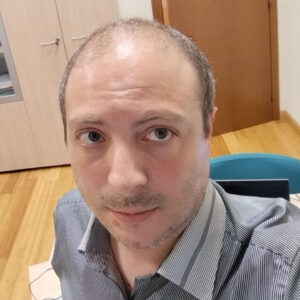
Agostino Sepe
Biography
Agostino Sepe is a Senior Lecturer in Chinese Studies in the Department of Humanities at the University of Trento, Italy, where he teaches Chinese language and linguistics. He previously held the position of Junior Lecturer at the University for Foreigners of Siena. Dr. Sepe earned his PhD in Chinese Studies from the University of Naples “L’Orientale” in 2018. His doctoral and graduate research included specialized training in Chinese language, linguistics, and Teaching Chinese as a Second Language at Shenyang Normal University, China. He also pursued studies in the Manchu language at Liaoning University and the Liaoning Archives in Shenyang.
Dr. Sepe’s research spans premodern Chinese history and linguistics. His historical work focuses on the Qing dynasty (1644-1911) and the regional history of Manchuria. His linguistic research concentrates on Teaching Chinese as a Second Language to Italian-speaking learners, with a specific emphasis on phonetics and vocabulary.
He is the author of a monograph, Impariamo a pronunciare il cinese (Rome, Orientalia Editrice, 2020, translated title: Let’s learn how to pronounce Chinese), and has published several scholarly articles on these subjects.
Research Interests: Bilingualism and Multilingualism, Comparative and Contrastive Linguistics, Cultural and Intercultural Studies

Andrea Binelli
Biography
Andrea Binelli works on the theory and semiotics of translation, the intersections between semiotics and pragmatics, sociolinguistics and Irish English, corpus linguistics, and discourse analysis, with a particular focus on digital media. He serves as local administrator of Sketch Engine for the University of Trento, whose main tools (especially Word Sketch and CQL) he uses to teach academic writing in L2 and to foster critical reflection on the use of corpora in foreign language teaching. His research has also addressed the analysis of comics and the use of metaphorical language in economic and political discourse.

Claudia Demattè
Biography
Claudia Demattè assumed the role of full professor of Spanish Literature at the University of Trento in May 2024. From December 2021 to May 2024 she occupied the role of full professor of Spanish Language and Translation (L-LIN/07) in the Department of Humanities at the University of Trento.
Her research interests include the study of 16th-century Spanish chivalric romances, the reception and translation of Miguel de Cervantes’ works in Italy, and the Golden Age Spanish theater, with a particular focus on the dramatist Juan Pérez de Montalbán. She serves as the Principal Investigator of the international project Un autor madrileño recuperado: Juan Pérez de Montalbán, undertaken in collaboration with institutions such as the City Council of Madrid, the Municipal Historical Library of Madrid, and the Complutense University of Madrid. Since 2005, she has overseen the publication of nine volumes in the “Obras de Juan Pérez de Montalbán” series at Reichenberger Edition, Kassel.
Professor Demattè is actively engaged in several international research collaborations, including HÍLICA – Hibridismo literario y cultura áurea at the Complutense University of Madrid and the Iberian Books of Chivalry in English Translation Series (IBCETS) at the Arizona Centre for Medieval and Renaissance Studies. Her national research endeavors involve significant contributions to multiple PRIN projects focused on Early Modern Spanish Theater and Spanish Romances of Chivalry.She was awarded the IX Marcelo Reyes Translation Prize by the Olifante Publishing House in Zaragoza for her translation of José Manuel Lucía Megías’s poetry collection, Trento, o el triunfo de la espera (March 2024).
Research Interests: Comparative and Contrastive Linguistics, Corpus Linguistics and Digital Humanities, Cultural and Intercultural Studies, Historical Literary Studies, Linguistics of Theatre Texts, Translation Studies

Dominic Stewart
Biography
Dominic Stewart is professor of English Language and Linguistics at the Department of Humanities, University of Trento. He is head of the English Language section and Department Delegate for relations with the Centro Linguistico di Ateneo.
He taught at the universities of Verona, Bologna and Macerata prior to transferring to the University of Trento in 2012. His research interests embrace corpus linguistics with particular reference to the platform Sketch Engine, Italian-English translation of tourist texts, and Italian-English contrastive analysis.
His monographs include Sketch Engine for Italian Learners of English (2024), Frequency in the Dictionary: A Corpus-Assisted Contrastive Analysis of English and Italian (2021), Italian to English translation with Sketch Engine: A Guide to the Translation of Tourist Texts (2018), Semantic Prosody: A Critical Evaluation (2010).
Research Interests: Applied Linguistics, Comparative and Contrastive Linguistics, Corpus Linguistics and Digital Humanities, Language Learning, Translation Studies
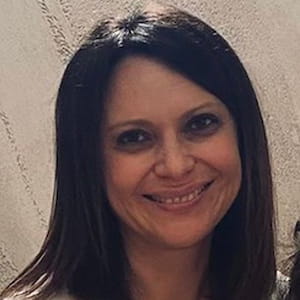
Elisa Ravazzolo
Biography
Elisa Ravazzolo received a PhD in French Linguistics from the University of Brescia, Italy, in 2007. After several experiences in scientific research and academic teaching, she joined the Department of Humanities of the University of Trento, where she became Associate Professor in 2020. In 2023, she obtained the Italian National Scientific Habilitation (ASN) for Full Professor in French Language, Translation and Linguistics.
Elisa Ravazzolo’s research primarily explores verbal interaction in French, emphasizing linguistic, enunciative, and pragmatic aspects through empirical-inductive analysis of natural oral interactions. Her work includes examining media-political interactions from an intercultural perspective, comparing French and Italian discourse. She also investigates how artistic-cultural mediation practices relate to social issues like the process of linguistic and cultural integration of migrants or the valorization and exposure of individual testimony for the (re)-construction of historical memory. Additionally, her interests include studying the linguistic and pragmatic features of theatrical texts, particularly focusing on translating oral phenomena. Part of her research also involves applying corpora of natural oral data to teach spoken French, enhancing practical understanding and application in educational settings.She has participated in several research projects, including the research international project “MarDisCo” (since 2023) funded by the Labex ASLAN (Advanced Studies on LANguage complexity, ENS – Université de Lyon) which intends to study the conversational uses of discourse markers and interjections of French and Italian talk-in-interaction. Since 2015 she has also participated in the application of pedagogical resources based on the results of research into the analysis of interactions (Corpus de langues parlées en interaction – Français Langue Étrangère). Her current research focuses on discursive and pragmatic characteristics of oral testimonies and on the practices of their cultural mediation in historical museums.
Research Interests: Comparative and Contrastive Linguistics, Corpus Linguistics and Digital Humanities, Cultural and Intercultural Studies, Discourse Analysis, Language Acquisition and Cognitive Linguistics, Language Learning, Linguistics of Theatre Texts, Media and Communication, Pragmatics, Translation Studies

Elsa Henriques Rita dos Santos
Biography
Elsa Rita dos Santos is an Associate Professor of Portuguese Literature at the University of Trento, where she teaches Portuguese language, culture, and literature both at the undergraduate and graduate levels. Prior to this, she had also taught at the Universities of Évora (Portugal) and Padua. Since 2018, she is a member of the research Centro de Literaturas e Culturas Lusófonas e Europeia (CLEPUL) at the University of Lisbon. In 2010, she obtained her PhD at the Universidade Nova de Lisboa (Teatro História Contexto, Lisboa, Colibri 2011), with research focused on two lines of inquiry already explored in previous (and subsequent) works: the theory of narrators in theatre and the theory of narrative in historiography. In 2017, she widened her field of research to include poetry particularly the theme of exile. While continuing her previous lines of research, she is currently exploring the various interpretations of the theme of the sea in Portuguese language, culture, and literature, drawing on diverse contests to analyse its multifaceted interpretations and representations.
Research Interests: Bilingualism and Multilingualism, Contact Linguistics, Dialectology and Linguistic Variation, Etymology, Lexicology and Lexicography, Minority and Heritage Languages, Sociolinguistics, Translation Studies
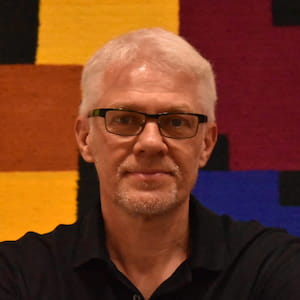
Ermenegildo Bidese
Biography
Ermenegildo Bidese received a PhD in German Linguistics from the University of Verona, Italy, in 2007, and a PhD in Philosophy from the Johann Wolfgang Goethe University of Frankfurt am Main, Germany, in 2001. After several experiences in scientific research and academic teaching, he joined the Department of Philology and Philosophy of the University of Trento, where he became Associate Professor in 2016. In 2018, he obtained the National Scientific Habilitation (ASN) for Full Professor in German Linguistics in Italy, and in 2021 the venia legendi (Habilitation) in German Linguistics and General Linguistics in Germany. In 2012, he was awarded a Fulbright Research Fellowship at the Department of Brain and Cognitive Sciences at MIT (Cambridge, MA). He has participated in several research projects, including the project AthEME (Advancing the European Multilingual Experience) funded by the European 7th Framework Programme (2014-2019) and the PRIN project ALPILINK (German-Romance Language Contact in the Italian Alps: documentation, explanation, participation) (2022-2025). He is currently PI of LingWA project (The language of others. Dynamic models of medieval German immigration in Trentino) (2024-2025) funded by the CARITRO fundation. Bidese’s current research focuses on the dynamics of specific language contact in the syntax of the Germanic minority languages of northern Italy, and on the sprachbund effect along the Alpine Germanic-Romance continuum. Another focus of Bidese’s work is the architecture of the language faculty and its origins. In this area, he is editor-in-chief of the academic journal Evolutionary Language Theory (ELT) published by Benjamins.
Research Interests: Applied Linguistics, Contact Linguistics, Dialectology and Linguistic Variation, Language Acquisition and Cognitive Linguistics, Minority and Heritage Languages, Philology, Syntax, Translation Studies

Fabiana Rosi
Biography
Since 2020, Fabiana Rosi is full professor of Educational Linguistics at the Department of Humanities, University of Trento. She is currently the Rector’s Delegate for Language Policy of the University of Trento. From 2021 to 2024 she was Rector’s Delegate for Language Education and President of the Language Centre of the University of Trento. She is founder and director of the Inter-University Research Centre “LinE – Language in Education”, composed of 12 European universities and 270 scholars from more than 40 scientific-disciplinary fields, which promotes scientific collaborations on the role of language in the teaching of different disciplines.
She graduated in Classic Literatures at the University of Pisa in 2004 and received a PhD in Linguistics at the University of Pavia in 2008. After research and teaching experiences in different Universities (Modena and Reggio Emilia, Bolzano, Genova, Siena), she has been associate professor of Educational Linguistics at the University of Salerno, where she coordinated teacher training courses in the area of Italian as part of the national network “I Lincei per la scuola” promoted by the Foundation “I Lincei per la scuola” and the National Academy of Lincei.
She has been participating in national and international scientific projects on Second Language Acquisition and Language Education. She is part of the editorial board of national and international journals, of scientific committees of national and international congresses and of the Doctoral School “Forms of Cultural Exchange and Textuality” of the University of Trento.
Fabiana’s research interests include Educational Linguistics, Language Education, Language Acquisition and Language Variation. She is currently studying the role of the mother tongue and the foreign languages in teaching different disciplines at school and at the university. She is also investigating the employment of advertising in Language Education from a grammatical, lexical, and intercultural perspective.
Research Interests: Applied Linguistics, Bilingualism and Multilingualism, Cultural and Intercultural Studies, Discourse Analysis, Language Acquisition and Cognitive Linguistics, Language Learning, Media and Communication, Pragmatics, Translation Studies
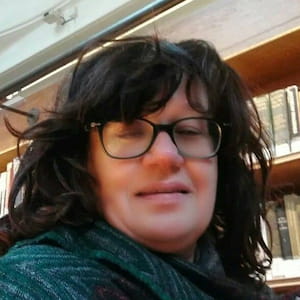
Federica Ricci Garotti
Biography
Federica Ricci Garotti is full professor of German Language and Linguistics at the Department of Humanities, University of Trento. She is responsible for teacher training and a member of the Inter-University Center for the History of Foreign Language Teaching for the University of Trento. He also serves as chairman of the Scientific Committee for the Institute of Moorish Language and Culture.
He taught in high school for more than ten years before coming to the University and SSIS. His research interests are: language acquisition and teaching, CLIL, languages of advertising and language variation.
His latest publications are: The rude language of advertising and propaganda, Franco Angeli, 2022. Die deutsche Adjektivflexion für italienische DaF-Studierende: Sprachdidaktische und erwerbstheoretische Perspektive, 2022. CLIL: Internationalisation or Pedagogical Innovation?, 2021. Das italienische gerundio in impliziter und expliziter Wiedergabe, 2020. Dialogue on CLIL. In: (ed.): Ricci Garotti F., Dialogue around CLIL between school and university, Studium, 2019. Die Rolle der Sprachenfolge und des interlingualen Einflusses in der Entwicklung fremdsprachlicher Textproduktion, 2018.
Research Interests: Applied Linguistics, Bilingualism and Multilingualism, Comparative and Contrastive Linguistics, Language Acquisition and Cognitive Linguistics, Language Learning, Media and Communication, Pragmatics

Gerardo Acerenza
Biography
Gerardo Acerenza (Ph.D.) is Professor of French Language and Translation within the Department of Humanities at the University of Trento, Italy. From 2003 to 2005, he taught French and French-Canadian literature in the Department of French and Italian Studies at the University of Waterloo in Ontario, Canada. During his tenure there, he organized an International Conference focusing on the role of French dictionaries in Quebec and French-Canadian literature, which resulted in the publication Dictionnaires français et littératures québécoise et canadienne-française (Ottawa, Éditions David, 2005).
He has authored several articles addressing the linguistic debates in Quebec, translations of Canadianisms into Italian, and the works of Quebecois writer Jacques Ferron, notably in his study Des voix superposées: plurilinguisme, polyphonie et hybridation langagière dans l’œuvre romanesque de Jacques Ferron (Trento, Labirinti, 2010).
Acerenza is also translator, focusing on authors from the French-speaking world, with a particular emphasis on works from Quebec and Cameroon. His translations include works by Cameroonian author Christian Kuate (two novels) and Quebecois novelist Patricia Godbout (one novel).
In 2019, he edited the volume Qu’est-ce qu’une mauvaise traduction littéraire? Sur la trahison et la traîtrise en traduction littéraire (Trento, Labirinti) and co-edited Adaptations d’histoires et histoires d’adaptations (Trento, Labirinti, 2019) with Sabrina Francesconi. Additionally, he co-edited Tours et contours de la traduction (Monographic Series in Human Sciences, Sudbury, 2021) with Ali Reguigui and Julie Boissonneault of Laurentian University, Ontario.
In 2022, he published the section on French-language Canadian/Quebec literature, titled Littérature canadienne/québécoise de langue française, in the Anthologie des littératures de langue française edited by M. Dokhtourichvili and A. Mamatsashvili at Tbilisi University Press.
Since March 2023, he has been serving as the General Director of the CIÉF – Conseil International d’Études Francophones.
Research Interests: Bilingualism and Multilingualism, Contact Linguistics, Dialectology and Linguistic Variation, Etymology, Lexicology and Lexicography, Minority and Heritage Languages, Sociolinguistics, Translation Studies
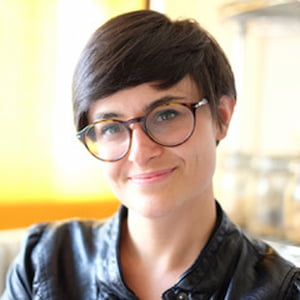
Giulia Tomasi
Biography
Giulia Tomasi, Doctor Europaeus in “Le Forme del Testo” (University of Trento, 2019), is currently Research Fellow (RtdB) at the University of Trento (2023-2026) and teaches courses in Spanish Language and Translation. She has been working for three years on the project Mapping Chivalry: Spanish Romances of Chivalry from Renaissance to XXI Century, a Digital Approach (PRIN 2017JA5XAR, PI: Anna Bognolo, Università di Verona), participating in several national and international conferences. She devotes her research to various resources of the Digital Humanities, such as data mining, OCR and HTR technologies and the tagging of literary texts. She also deals with literary translation with a special focus on Spanish-Italian relations, young adult literature and linguistic variation. She is also specialised in Spanish Books of Chivalry, with special attention to the literary motifs developed in the plots. On all these subjects she has published articles in high-impact journals, such as Historias Fingidas, Orillas and Tirant, and in several volumes; she has also edited the comedy Don Florisel de Niquea by Juan Pérez de Montalbán, volume 2.2 of the Segundo tomo de comedias (Kassel: Reichenberger, 2020).
Research Interests: Corpus Linguistics and Digital Humanities, Dialectology and Linguistic Variation, Historical Literary Studies, Language Acquisition and Cognitive Linguistics, Linguistics of Theatre Texts, Translation Studies

Helena Steiger
Biography
In 2003, she completed her degree as Magistra Artium at the Technical University of Dresden, specializing in Slavic Studies, Romance Studies, and Economic and Social History. Following her graduation, from 2003 to 2005, she embarked on a teaching career at a school located in Lusern, Trentino, applying her academic skills in a practical teaching environment. Since 2005, she has been engaged in a teaching role as CEL at the University of Trento, continuing her dedication to education and contributing to academic growth at the university level.
Research Interests: Bilingualism and Multilingualism, Cultural and Intercultural Studies, Dialectology and Linguistic Variation, Language Acquisition and Cognitive Linguistics, Language Learning, Minority and Heritage Languages, Phonetics and Phonology, Sociolinguistics
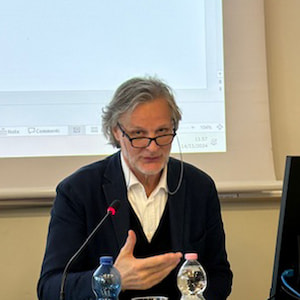
Jean Paul Dufiet
Biography
Jean Paul Dufiet is full professor in the Department of Humanities at the University of Trento, where he teaches courses on Linguistics, French Literature, Theatre Studies, Discourse Analysis, Translation Studies, and Museum Mediation.
He holds a Master’s degree and a Diplôme d’Études Approfondies (DEA) from Sorbonne Nouvelle University, as well as a degree from the Catholic University of Milan. His primary research interests focus on Discourse Analysis, particularly within the framework of the French School of Discourse. He applies his expertise in Discourse Analysis to both classical and contemporary theatre texts, exploring how linguistic and cultural contexts influence their interpretation and translation.
In addition to his work on Theatre, Professor Dufiet has a longstanding research interest in Museum Mediation. He examines the ways in which art and history museums engage with and communicate cultural artifacts to the public.
He has extensively researched how theatrical works are translated and adapted, particularly between Italian and French contexts. He is the lead investigator of several prominent research projects in Italy and France, and he heads Dorif, a research group dedicated to the translation of theatre texts. Through Dorif, he has directed multiple interdisciplinary initiatives exploring the relationship between language, culture, and performance. His research also extends to contemporary dramaturgy and the mediation of art objects, bridging academic theory with practical applications in museums and theatres.
With over 150 publications, Professor Dufiet’s academic influence extends internationally, and he collaborates with scholars across Europe, particularly between Italy and France. His body of work includes scholarly articles, book chapters, and edited volumes that explore key themes in Translation, Discourse Analysis, and Cultural Mediation.
Research Interests: Applied Linguistics, Comparative and Contrastive Linguistics, Discourse Analysis, Linguistics of Theatre Texts, Media and Communication, Pragmatics, Translation Studies

Jorge Canals Piñas
Biography
Jorge Canals-Piñas got his PhD in Spanish Philology at the Universitat Autònoma de Barcelona under the supervision of Prof. Alberto Blecua in the year 2001. Before joining in 2002 the Department of Humanities, University of Trento, he had previous teaching activities in the field of Spanish Language at the Universities of Ljubljana (Slovenia), Trieste and Chieti-Pescara. In the year 2015 he became Associate Professor of Spanish Language and Translation. Nowadays his research deals mainly with cultural studies and contemporary Spanish literature and in his works he pays attention to linguistic aspects. In the period 2015-2016 he was a member of the interdisciplinary project entitled “Wars and Post-War: States and Societies, Cultures and Structures”, which was declared a research project of strategic interest by the University of Trento. In the years 2008-2010 he participated as an active member in the research program “Language and Culture in Tourism” (PRIN: Protocollo 2007ASKNML_003).
Research Interests: Cultural and Intercultural Studies, Discourse Analysis, Media and Communication, Popular Studies, Translation Studies
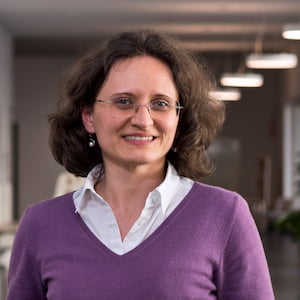
Katharina Salzmann
Biography
Katharina Salzmann received a PhD in German Linguistics from the University of Pisa, Italy, in 2015. From 2016 to 2018 she was a research assistant at the Istituto Italiano di Studi Germanici, Rome in an international project on multilingualism. From 2018 to 2022 she worked as a Junior Assistant Professor at the Free University of Bozen-Bolzano, Faculty of Education, where she gained valuable experience in the field of language acquisition, teacher training and didactics with young children. In 2020 she obtained the National Scientific Habilitation (ASN) for Associate Professor in German Linguistics in Italy. In April 2024 she joined the Department of Philology and Philosophy of the University of Trento as a Senior Assistant Professor.
She participated in several research projects, including GeWiss (an international project on spoken academic communication) during PhD (2012-2015), and a project on German as a third language and multilingualism in the European Union funded by the Italian Ministry of Education (2016-2018). She was co-PI of a project on first and multilingual language acquisition in kindergarten children growing up in the Ladin valleys in South Tyrol (2019-2021) and currently collaborates in the PRIN project “German Language in Italy: where we are and where we want to go”, in a trilateral (Germany-Italy-France) project on digitally mediated academic communication as well as in the Erasmus+ project “Diversity in action: a cross-border online space for training teachers through multilingual and multicultural experiences”.
Salzmann’s current research focuses on the acquisition of grammatical and pragmatic knowledge in German as a first or second language in children at kindergarten age and on the acquisition of German as a third language after Italian and English. Another focus of Salzmann’s work is the study of spoken German, including the academic variety of different genres, such as conference talks and digital or hybrid lectures.
Research Interests: Applied Linguistics, Bilingualism and Multilingualism, Comparative and Contrastive Linguistics, Corpus Linguistics and Digital Humanities, Cultural and Intercultural Studies, Discourse Analysis, Language Acquisition and Cognitive Linguistics, Language Learning, Pragmatics

Linda Badan
Biography
Linda Badan is Assistant Professor of Linguistics at the University of Padova. She obtained her PhD from the University of Padova and has held various research fellowships, including the Chiang Ching-kuo Foundation for International Scholarly Exchange Grant (Taiwan) and the International Fellowship for Experienced Researchers Fernand Braudel-IFER (École Normale Supérieure, Paris). She has been a postdoctoral fellow at the City University of Hong Kong, Leiden University, the École des Hautes Études en Sciences Sociales, and the Centre de Recherches Linguistiques sur l’Asie Orientale in Paris. Previously, she held the position of Associate Professor of Linguistics at Ghent University (Belgium) and Assistant Professor at the University of Trento (Italy). Her main research interests include theoretical linguistics at the interfaces between syntax and prosody, syntax and pragmatics, comparative syntax of Sinitic, Romance, and African languages, and the acquisition of Chinese and Italian as second languages.
Research Interests: Comparative and Contrastive Linguistics, Dialectology and Linguistic Variation, Discourse Analysis, Language Acquisition and Cognitive Linguistics, Language Learning, Phonetics and Phonology, Pragmatics, Sociolinguistics, Syntax

Lorenzo Bocchi
Biography
Lorenzo has a Master’s degree in Data Science, and currently works as a Digital Humanist at the University of Trento. He deals with the construction of websites and web applications, as well as the maintenance of digital resources.
Research Interests: Corpus Linguistics and Digital Humanities
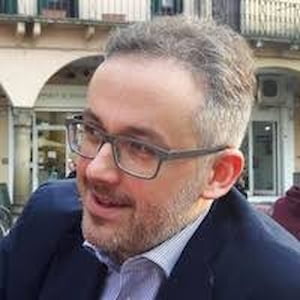
Luca Morlino
Biography
Luca Morlino is Assistant Professor of Romance Philology and Linguistics at the University of Trento, where he also taught as Instructor. He previously taught Italian Language and Culture at the Universities of Torun (UMK), Gdansk (ASW) and Warsaw (SWPS), and Rheto-Romance Language and Culture at the University of Bozen. Before that, he was a Post-doc Research Fellow at the Italian Council Research (CNR) Institute “Opera del Vocabolario Italiano” in Florence and at the University of Padua, where he graduated and received his PhD in Romance Philology and Linguistics.
He has published critical editions with linguistic commentary of Medieval Romance literary texts. He is also the author of many articles on Medieval Romance Languages and Literatures, with particular reference to the topics indicated below.
He obtained the National Scientific Qualification (ASN) as both Associate Professor and Full Professor in Romance Philology and Linguistics.
Research Interests: Corpus Linguistics and Digital Humanities, Cultural and Intercultural Studies, Discourse Analysis, Etymology, Lexicology and Lexicography, Historical Literary Studies, Philology, Translation Studies
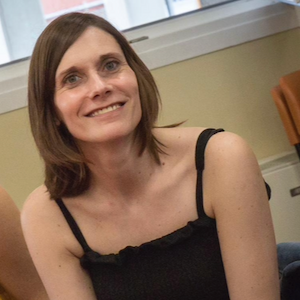
Manuela Caterina Moroni
Biography
Manuela Caterina Moroni is professor of German linguistics in the Department of Foreign Languages, Literatures, and Cultures at the University of Bergamo. She was affiliated with the Department of Humanities and Philosophy at the University of Trento for the period of 2007 to 2021, initially as a researcher and subsequently as an associate professor. The focus of her doctoral dissertation (University of Verona, 2006) was on the relationship between the syntax and modal particles of German in spoken language, analysing how they interacted with information structure and intonation. In her habilitation thesis (Bern, Switzerland, 2019), she investigated how intonation influences spontaneous conversations in German and Italian. Moreover, she has engaged in research stays at the Institute for the German Language in Mannheim, with substantial financial support from the DAAD, and has provided instruction in German linguistics at the University of Dresden. Her principal research interests include the expression of modality (modal particles, modal verbs) and intonation in German and Italian.
Research Interests: Applied Linguistics, Comparative and Contrastive Linguistics, Corpus Linguistics and Digital Humanities, Language Learning, Media and Communication, Phonetics and Phonology, Pragmatics, Syntax, Translation Studies

Marco Magnani
Biography
Marco Magnani is a Senior Lecturer of Russian language and linguistics at the University of Trento. He earned his Ph.D. in Linguistics with the title of Doctor Europaeus from the University of Verona, where he also completed both his Bachelor’s and Master’s degrees in Linguistics and Foreign Language Pedagogy. His academic profile is enriched by extensive international experience, including advanced Russian language studies at Moscow State University, research fellowships at the University of Oxford in the UK, and a visiting fellowship at the University of Western Sydney in Australia.
Since joining the University of Trento, he has been teaching a wide range of courses, including introductory Russian language and linguistics, theories of second language acquisition, as well as advanced topics such as the Russian verb system, syntax and information structure, and the intersection of cultural linguistics and pragmatics. He has also lectured at the Free University of Bolzano and the University of Verona, where his teaching covered Russian linguistics and Slavic philology.
His research spans several key areas, with a particular focus on the acquisition and teaching of Russian as a second language. In this regard, his contributions delve into the morphology and syntax of the Russian language, exploring marked cases and word order from both theoretical and acquisitional perspectives. Furthermore, he investigates the development of pragmatic skills, including the ability to process conversational implicatures and to manage speech acts from a cross-cultural perspective.
A noteworthy aspect of his research is the application of Processability Theory, a renowned framework of second language acquisition, to the study of L2 Russian. His achievements in this area have earned him a respected place in the field, resulting in invitations to deliver keynote presentations. In addition, he explores the cognitive advantages of multilingualism and the preservation of minority languages, participating in international networks and research group dedicated to promoting language contact. His work not only advances linguistic theory but also supports linguistic diversity and language learning initiatives.
He is currently the Vice Principal Investigator of the PRIN research project “SyllaRus“, which aims to advance the study of the Russian language in Italian universities. The project seeks to develop high-level teaching practices by bridging linguistic competence with metalinguistic awareness.
Research Interests: Applied Linguistics, Bilingualism and Multilingualism, Comparative and Contrastive Linguistics, Language Acquisition and Cognitive Linguistics, Language Learning, Minority and Heritage Languages, Pragmatics, Syntax
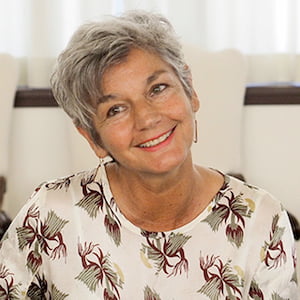
Patrizia Cordin
Biography
Patrizia Cordin is a Senior Professor of Linguistics at the Department of Humanities, University of Trento, where she began her academic career as a researcher in 1985. Prior to joining the University of Trento, she was a research fellow at the Accademia della Crusca in Florence, a researcher at the Scuola Normale Superiore in Pisa, and a visiting scholar at MIT.
At the University of Trento, she has held several institutional roles, including serving as the Rector’s Delegate for initiatives related to linguistic minorities.
She has also taught Linguistics at the IULM (Istituto Universitario di Lingue Moderne-Feltre) and the Institut für Romanistik at the University of Innsbruck. Additionally, she has been a member of the scientific committee of Antropolad, a master’s program for educators in the Ladin-speaking areas of Trentino, the Director of a master course for training teachers of Mòcheno and Cimbrian (IALM – Insegnare e apprendere lingue di minoranza), the Vice President of the Provincial Toponymy Committee of Trentino, and the Secretary of the SLI – Società di Linguistica Italiana. She is currently the Director of Bilingualism Matters Trento-Verona.
Her research focuses on multilingualism, lexicography, and language variation, with a particular emphasis on Romance local and minority languages. She has published nearly 200 works on these topics, including articles in international journals and volumes edited by leading publishers.
Patrizia Cordin has participated in numerous research projects, such as: ALTr (Archivio Lessicale dei Dialetti Trentini), a lexical database project; Tandem Language Learning, a strategic initiative of the University of Trento; CLaM, a sociolinguistic inquiry on three minority languages (Cimbro, Ladin, Mocheno); AThEME (Advancing the European Multilingual Experience), an European research project; Le Nuove Frontiere dei Diritti all’Istruzione (funded by FSE and IPRASE); VinKo (Varieties in Contact) and TREiL (Tools for research and education in linguistics), both funded by PRIN, and AlpiLink (German-Romance Language Contact in the Italian Alps: documentation, explanation, participation), also funded by PRIN.
Research Interests: Bilingualism and Multilingualism, Contact Linguistics, Dialectology and Linguistic Variation, Etymology, Lexicology and Lexicography, Language Learning, Minority and Heritage Languages, Morphology, Sociolinguistics, Syntax
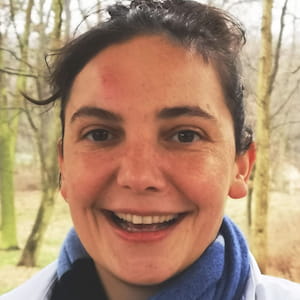
Paula Rebecca Schreiber
Biography
Paula Rebecca Schreiber is currently research fellow in the RUM – Rethinking, Understanding Modal Particles project at the University of Bergamo, which is conducted in collaboration with Ca’ Foscari University of Venice, University of Piemonte Orientale, and University of Messina. Her areas of expertise are corpus linguistics and contrastive linguistics. From 2022 to 2023, she served as a lecturer in Italian Linguistics at the Trier University and collaborated on the CLaM 2021 – Cimbro Ladino Mòcheno 2021 project at the University of Trento, where she also participated as research fellow in the Tandem Language Learning project from 2019 to 2021. Between 2013 and 2019, she was research assistant at the TU Dresden. Her doctoral thesis, “Hip Hop Linguistics and Resistance Vernacular,” investigates the linguistic recontextualization of popular cultures through a multidisciplinary approach, combining sociolinguistics, pragmatics, and discourse analysis. Since April 2023, she has been expanding her expertise in International Computer Science and Media at the University of Applied Sciences Berlin, with an emphasis on Software and Web Development, and Visual Computing.
Research Interests: Applied Linguistics, Bilingualism and Multilingualism, Comparative and Contrastive Linguistics, Corpus Linguistics and Digital Humanities, Dialectology and Linguistic Variation, Discourse Analysis, Language Learning, Media and Communication, Sociolinguistics

Romano Madaro
Biography
Romano Madaro is currently a postdoctoral researcher at the University of Verona. He is working on the PRIN-project PARTHICO (Parameter Theory in Historical Corpora), investigating the diachrony of Relative Clauses in Early New High German using syntactically annotated corpora. He is also involved in the LiTI (Lingua Tedesca in Italia) and LingWA (Linguistic Waves in the Alps) projects. He obtained a joint Ph.D. (University of Trento and University of Augsburg) in German linguistics with a thesis on the syntax of Tischelwang-Deutsch. In 2023, he was a Visiting Scholar at the University of Göttingen in Germany.
His research focuses on the syntax of Germanic languages within the Parameter Theory. His area of interest includes contact-induced phenomena and language change involving the structure of subordination and verb syntax, as well as German language acquisition and learning in bilingual settings, particularly for Italian L1 speakers.
Research Interests: Applied Linguistics, Bilingualism and Multilingualism, Contact Linguistics, Corpus Linguistics and Digital Humanities, Dialectology and Linguistic Variation, Language Acquisition and Cognitive Linguistics, Language Learning, Minority and Heritage Languages, Sociolinguistics, Syntax
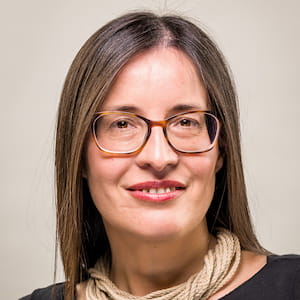
Sabrina Francesconi
Biography
Sabrina Francesconi is associate professor of English Language and Translation at the University of Trento. She teaches in the Bachelor’s program in Modern Languages and the Master’s program in Anglo-American Literatures, Translation, and Literary Criticism. Her research interests encompass audiovisual adaptation studies, humor studies, multimodal analysis, genre analysis, and stylistics. Additionally, she has a strong focus on specialist languages, particularly in the areas of tourism, commerce, and cultural heritage. She has published extensively on tourism and cultural heritage discourse, including four monographs: Heritage Discourse in Digital Travel Video Diaries (Tangram, 2018), Reading Tourism Texts: A Multimodal Analysis (Channel View Publications, 2014), Generic Integrity and Innovation in Tourism Texts in English (2012), and English for Tourism Promotion: Italy in British Tourism Texts (2007). Alongside she edited Translating Tourism: Linguistic/Cultural Representations (2006) with O. Palusci. Her research in stylistics has primarily centered on Alice Munro’s narrative style and the audiovisual adaptations of her stories. Two books, Alice Munro, il piacere di raccontare (Carocci, 2015) and A Multimodal Stylistic Approach to Screen Adaptations of the Work of Alice Munro (Routledge, 2023), complement her extensive collection of articles and essays published throughout the years.
Research Interests: Applied Linguistics, Cultural and Intercultural Studies, Discourse Analysis, Media and Communication, Popular Studies, Sociolinguistics, Translation Studies
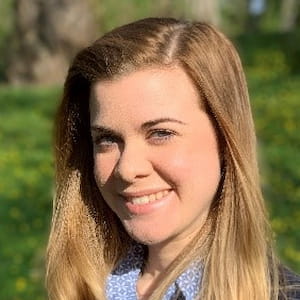
Serena Bissolo
Biography
Serena Bissolo is a research fellow in linguistics at the University of Trento. She is currently working within the PRIN funded Project AlpiLinK “German-Romance Language Contact in the Italian Alps: documentation, explanation, and participation” (PI Ermenegildo Bidese).
She earned her Master’s Degree in “Deutsch als Fremd- und Zweitsprache“ at the Herder-Institut of the University of Leipzig in Germany and a Master’s Degree in “Euro-American Literatures, Translation and Literary Criticism” at the University of Trento. During her time in Leipzig she had the opportunity to be a university tutor in German as a foreign academic language and to teach seminars for the Bacherlor’s and Master’s Degree in the subjects “German Phraseology” as well as “German as a foreign academic language” of the Herder-Institut.
Her research interests lie in the fields of academic German, corpus linguistics, comparative linguistic analysis of German and Italian, Germanic languages spoken in Trentino and language contact between Germanic and Romance languages in Northern Italy.
Research Interests: Applied Linguistics, Bilingualism and Multilingualism, Comparative and Contrastive Linguistics, Contact Linguistics, Corpus Linguistics and Digital Humanities, Etymology, Lexicology and Lexicography, Language Learning, Minority and Heritage Languages

Serenella Baggio
Biography
Serenella Baggio has been professor of Italian Linguistics at the University of Trento since 2002. She achieved her qualification for full professorship in 2014, requalified in 2019, and was appointed to the highest professorial tier in 2021. Her academic journey began under the guidance of Gianfranco Folena at the University of Padova, where she earned her degree in 1978, her specialization in 1987, and her Ph.D. in the same year. Her early career included a significant period as a lecturer of Italian at the University of Würzburg from 1979 to 1983, and she held a teaching position at high school from 1987 to 2001.
In 2001, she qualified as an associate professor in Italian Linguistics and joined the Faculty of Letters and Philosophy in Trento. Serenella Baggio is a member of the Doctoral School and has been involved in dual master’s and doctoral degrees with the Technische Universität Dresden and the University of Augsburg. She has organized diverse interdisciplinary conferences blending linguistics with anthropology and has contributed to the ERC-2020-AdG Graff-IT project on graffiti in medieval churches. Her ongoing involvement includes the PRIN project on Ps. Albertus Magnus’s De mirabilibus mundi, led by Alessandro Palazzo.
Her publications span various domains within Italian linguistics and philology, including studies on non-literary medieval texts focusing on encyclopedias and medical translations, as showcased in her examination of common Italian in 17th-century Venice (Testimonianze di italiano comune nella Venezia del ‘600, 2023). She has collaborated on early vernacular documents with E. Curzel in Studi Trentini. Storia, and her critical analysis of Boccaccio and debates on anti-Boccaccism are detailed in numerous writings. Her work extends to cultural transfer studies about the migration of Italian culture to Dresden and broader linguistic issues. She also engages deeply with popular writings, encompassing a wide array of texts from correspondences, diaries to memoirs and graffiti, which she studies as part of a broader examination of vernacular expressions and social histories. This exploration covers diverse topics such as transoceanic emigration, writings by miners during the Great War, and letters to television celebrities, undertaken in collaboration with the Archive of Popular Writing in Trento.Serenella Baggio’s research also covers bourgeois writings of the 20th century, focusing on liberal anti-fascism and the architectural milieu, and includes studies on political figures such as Gianni Rodari. Moreover, she explores the use of gestures in spoken language, as seen in her co-edited volume Gesticolar parlando (2022). She has also made significant contributions to the understanding of non-verbal communication in historical contexts through her editorial work on the edition of the Phonogrammarchiv zu Wien (2019).
Research Interests: Applied Linguistics, Corpus Linguistics and Digital Humanities, Cultural and Intercultural Studies, Dialectology and Linguistic Variation, Etymology, Lexicology and Lexicography, Historical Literary Studies, Media and Communication, Philology, Philosophy of Language and History of Linguistics, Popular Studies

Simone Barco
Biography
Simone Barco is a postdoctoral researcher at University of Trento in the LingWA project (P.I. Ermenegildo Bidese). He cooperates in the management of TreLinLab, having previously been involved in the former University of Trento Phonetics Laboratory, under the supervision of Serenella Baggio.
He studied in Turin before obtaining a PhD in Linguistics from University for Foreigners of Siena during which he was a visiting PhD student at Cambridge and Vienna.
His research focuses on language contact as well as on the use of dialects in society, with a current emphasis on the syntax of Trentino dialects.
Research Interests: Applied Linguistics, Contact Linguistics, Dialectology and Linguistic Variation, Media and Communication, Popular Studies, Sociolinguistics

Sofia Graziani
Biography
Sofia Graziani is Associate professor of Chinese Studies at the Department of Humanities and the School of International Studies at the University of Trento, where she teaches courses of Chinese language and culture and History of modern and contemporary China.
Her research focuses on the history of modern and contemporary China, with a specific interest in the CCP’s management of and discourse surrounding youth and the role played by Chinese youth organisations both at the domestic level and from a historical transnational perspective. She has also worked on China-Italy relations during the Cold War years as well as on Beijing’s people diplomacy and global soft power strategy, including the analysis of China’s discourse and official narrative about China-Africa relations in the XXI century.
She is currently local PI of a research project funded by the Italian Ministry of Education and Research (PRIN – Research Projects of National Relevance) entitled “Biographical Database of Italians in China, 1866-1970” jointly conducted by Sapienza the University of Rome (national coordination unit), the Catholic University of the Sacred Heart (Milan), and the University of Trento.
Her works have appeared in various international academic journals dedicated to East Asia/China, such as Modern Asian Studies, Twentieth- Century China, European Journal of East Asian Studies and The Journal of the European Association of Chinese Studies.
She has recently co-edited (together with Laura De Giorgi and Yang Weijian) a special issue of the European Journal of East Asian Studies (Brill), Issue 1, 23 (2024) titled “Chinese Youth and Socialism, from the Soviet Republic to the Early Post-Mao Years: Historical and Cultural Perspectives” https://brill.com/view/journals/ejea/23/1/ejea.23.issue-1.xml
Prior to joining the University of Trento, she was a recipient of the Chiang Ching-Kuo Foundation’s postdoctoral fellowship (Taiwan, 2012-2013), held a three-year research position (RTDa) at the University of Bologna (2013-2016) and taught courses of History and Institutions of Modern China/East Asia at various Italian universities as well as at Peking University. From 2019 to 2023 she has been a member of the Board of the Italian Association of Chinese Studies.
Research Interests: Corpus Linguistics and Digital Humanities, Cultural and Intercultural Studies, Media and Communication, Sociopolitical and Diplomatic Studies, Translation Studies

Teresa Barberio
Biography
Research Interests: Bilingualism and Multilingualism, Language Acquisition and Cognitive Linguistics, Language Learning




